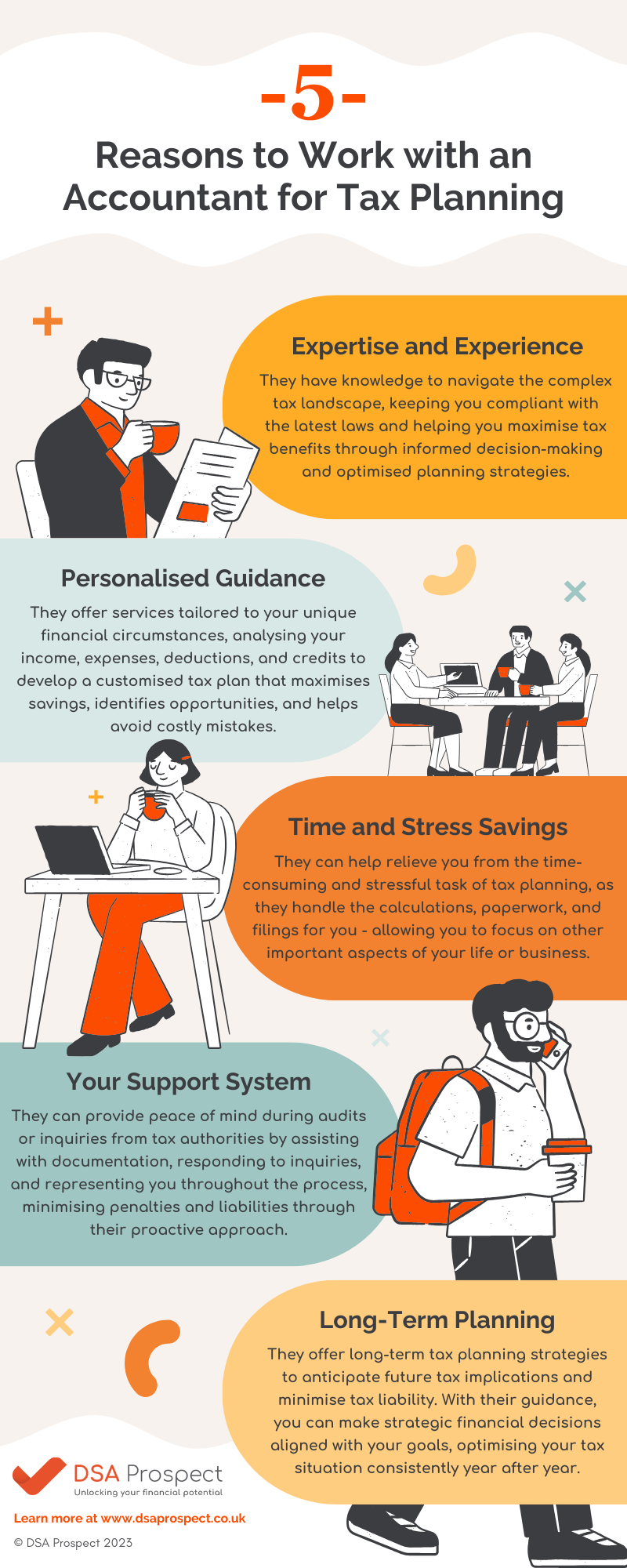What is tax planning?
A guide to tax planning and frequently asked questions
Tax planning is a proactive financial practice that helps individuals and businesses manage their taxes and make smart financial decisions. It involves looking at the bigger picture of someone's financial situation and ensuring that everything is working together to make the most of their money.
The tax planning process involves carefully evaluating factors like income sources, investments, expenses, and potential deductions. The goal is to not only reduce tax obligations but also maximise the benefits and advantages available under the tax laws.
It allows people to make informed decisions that align with their long-term goals and improve their financial well-being. No matter what your objects are having a tax strategy in place is important for achieving financial stability and success.
Whether you're new to taxes or an experienced taxpayer, this resource is a roadmap that empowers you to make well-informed decisions when it comes to taxes.
This guide will help you understand the basic principles of tax planning. Whether you're new to taxes or an experienced taxpayer, this resource is a roadmap that empowers you to make well-informed decisions when it comes to taxes.
Why is tax planning important?
Understanding tax planning strategies is important for anyone who wants to improve their financial situation. Without proper planning, you may end up paying more in taxes than necessary, which can have a significant impact on your overall income and investments. By using tax deductions, exemptions and credits you can optimise your tax position and allocate any savings towards other important financial goals, like saving for retirement, paying for education, or investing.
The basics of tax planning
Whether you're an individual or a business owner, understanding how tax planning works is essential because it helps you manage your money efficiently. The UK tax system is complex and has many laws, rules, and processes for collecting, calculating, and paying taxes. To understand tax planning, it's important to focus on three key areas:
I. Understanding the basic principles of tax planning
It's important to have a clear understanding of the fundamental principles that serve as the cornerstone of tax planning - after all they're what tax planning is all about!
These principles provide a helpful framework for effectively handling your taxes, so let's delve into these principles:
-
Tax compliance: To effectively tax plan, you need to follow the rules set by HMRC to guarantee that you are accurately paying your taxes and avoiding any penalties.
-
Maximising tax benefits: Getting the most out of your tax planning means making sure you're leveraging allowances, deductions, exemptions, and reliefs to optimise your overall tax position.
-
Reducing tax burdens: One of the main objectives of tax planning is minimising the amount of tax you owe using lawful tax-related methods.
-
Record-keeping: An essential element of tax planning is maintaining accurate and thorough records to support your claims and ensure compliance.
-
Active planning: Tax planning isn't a one time thing - you'll need to regularly review your finances and strategically plan financial activities to identifying opportunities for tax savings and capitalise on the available opportunities.
II. Getting to know the different types of taxes
To understand your financial obligations, it's important to know if you're responsible for paying certain kinds of taxes and how they will affect your finances. Don't forget that there are several different kinds of taxes, they have their own rules and each one can have a significant impact on your funds.
For example: Income tax is usually associated with the money we earn from employment - but it can also be applied to rental income or investment gains. If you receive earnings from all three sources, each one will affect the amount of tax you need to pay. Understanding these nuances will help you manage your money effectively.
What are common types of tax?
| Tax Category | When are taxes imposed? |
| Income Tax | Income tax is paid on a wide range of income sources, including salaries, self-employment earnings, dividends investments, and rental income. The specific rates vary depending on the individual's income level and are calculated based on different tax brackets. |
| Property Tax | Stamp Duty Land Tax (SDLT) is a property tax levied in the UK when acquiring land, buildings, or property. It is determined by the value of the property, with rates that fluctuate based on the purchase price and type of property. |
| Capital Gains Tax | Capital Gains Tax (CGT) is a tax that is levied on the profits gained from the sale of assets such as real estate. The rates of CGT vary depending on the type of asset and the individual's income level. |
| Inheritance Tax | Inheritance Tax is payable on the transfer of assets from an individual to their beneficiaries |
| Corporation Tax | Corporation Tax is payable on the profits earned by companies. The tax rate for corporate tax can vary depending on the size of the business. For smaller businesses the tax rate may be lower to help them reinvest back into their venture. |
| Value Added Tax | Value Added Tax (VAT) is a widely applied consumption tax that is calculated based on the value added to goods and services. Businesses need to be well-versed in VAT tax laws to accurately collect and remit sales tax. |
| National Insurance | National Insurance Contributions (NICs) are a fundamental part of the UK tax system. NICs are paid on income and profits earned by employees, employers, and self-employed individuals. |
To mitigate your taxes effectively, it's imperative to consider timing. This means thinking about when you make financial decisions that can impact your tax bill. Timing plays a vital role and should be taken into account throughout the year, not just during tax season. Keep in mind that tax planning is an ongoing process that requires continuous monitoring and adjustments. By being forward-thinking and mindful of timing, you can have more control over your taxes.
Key times for making tax planning decisions:
Start of the financial year
It's generally advised to start tax planning at the beginning of the financial year in April. Starting early gives you time to research and understand different ways to save on taxes. It also helps you align your financial goals with your tax-saving goals.
Mid-year tax review
Assessing your income, expenses, deductions, and credits halfway through the year is an important part of your tax strategy. By carefully examining your financial situation, you can find opportunities to maximize your tax benefits, fix any problems, and take advantage of any missed chances before the year ends.
Year-end planning
As the tax year comes to a close, it's crucial to carefully think about your tax planning decisions. This time offers a valuable chance to take any last-minute actions that can help you reduce your tax burden for the current year. It's an opportunity to make use of strategies that can help lower the amount of taxes you owe.
Life events
Life events like getting married, having a child, buying a house, or starting a business can greatly influence your taxes. It's important to think about the tax consequences of these milestones and make smart decisions to benefit from any available tax advantages.
The benefits of tax planning
Tax planning provides opportunities to reduce the amount of taxes you owe, enabling you to have more financial flexibility for the things you need or want. Whether it's purchasing a new car, putting money aside to purchase a home, or securing your future through savings, tax planning empowers you to make the most of your hard-earned money.
For businesses, tax planning is extremely important as it can help reduce tax bills. By doing so, businesses can unlock additional funds to invest in expanding their operations, hiring more people, and enhancing their products and services. Staying well-informed about tax regulations and implementing strategies can help businesses effectively maximise their profits and maintain a strong competitive edge in the market.
Let's take a closer look at some key benefits of tax planning:
-
Increased savings: By taking full advantage of relevant deductions and credits, you can hold onto a greater portion of your earnings and direct the additional funds towards achieving your financial goals.
-
Minimising tax obligations: The main advantage of tax planning is reducing your tax liabilities. By carefully examining your financial circumstances and using legitimate tax strategies, you can discover deductions, credits, and exemptions that will effectively reduce your overall tax burden.
-
Business tax advantages: Tax planning offers numerous benefits for businesses. It not only helps reduce the amount of taxes a company owes but it also boosts cash flow for day-to-day operations, among other benefits.
-
Asset protection: Tax planning is an essential part of estate planning, providing individuals with the means to reduce estate taxes, safeguard their assets, and effectively pass on wealth to future generations. By employing specific strategies you can optimise their estate plan and secure a lasting legacy.
-
Reduced risk of penalties and audits: By implementing effective tax planning strategies early on, you can ensure full compliance with tax laws and regulations, lowering your chances of facing penalties and audits. Through organisation, maintaining records, and adhering to the rules, you can steer clear of expensive errors and potential legal complications.
Key strategies for effective tax planning
Tax planning helps you reduce the amount of taxes you owe by using different strategies to make the most of deductions, credits, exemptions, and incentives. It's important to customise your tax plan to fit your own financial situation and your needs as either an individual or business owner.
It's always a good idea to get help from professionals who understand the complexities of the UK tax system, particularly if you need assistance within a niche area such as estate planning. They can give you personalised advice to optimise your tax strategy.
What are some common tax planning strategies?
By deducting business-related expenses, you can mitigate the portion of your earnings that is subject to tax. When you claim eligible expenses, they are subtracted from your overall income, resulting in a reduced taxable income. These deductible expenses encompass a wide range of items, including office supplies, travel expenses, equipment costs, and more.
Paying into a private pension can be used as a tax-savings strategy as these contributions have the potential to provide tax relief. This is a complex area of tax and therefore it's important to seek independent financial advice from a professional who specialises in the types of investments available and how they work within the pension fund, as well as the associated tax implications.
To make sure you're getting all the tax benefits you're entitled to, it's important to claim any applicable tax relief and allowances. The specific options available will depend on whether you're an individual or a business. It is recommended to begin exploring your tax relief options at the beginning of the tax year as some may not be possible if you're claiming late in the year.
Managing capital gains is an important part of tax planning as it can significantly impact an individual's or business's tax liability. Capital Gains Tax (CGT) is a tax imposed on the profit earned from selling certain assets. By considering factors like timing, eligible tax allowances, and taking advantage of reliefs, individuals can effectively minimise their tax obligations on capital gains.
Tax-efficient investment options can help you generate income at lower tax rates, get tax relief on capital gains, and reduce inheritance tax. By including these investments in your financial plan, you can potentially optimize your tax situation, decrease your tax obligations, and even increase your investment returns.
Getting started with tax planning
Whether you're an individual, self-employed, or a business owner, getting started with tax planning might feel overwhelming. But with the right approach, it can be a simple and effective process that puts you in control of your financial future.
Here are seven steps to help you get started with tax planning:
-
Evaluate your financial position
Take a close look at your current financial situation to get a clear understanding of where you stand. Dive into your earnings, expenses, investments, and any other financial factors that could impact your taxes. This analysis will help you identify potential opportunities for tax savings and give you a solid starting point.
-
Gain knowledge
Familiarise yourself with the tax laws and regulations that apply to your specific situation. Stay in the loop with any recent updates or changes to the tax code that could impact your tax planning strategies. Having a solid understanding of the rules and incentives available to you will empower you to make informed decisions.
-
Set clear goals
Take the time to clearly define your objectives when it comes to tax planning. Determine what your ultimate goal is, whether it's reducing your tax burden, maximising eligible deductions, or utilising tax credits. By having well-defined goals, you will have a roadmap to guide your tax planning strategies.
-
Get expert guidance
It's always a great idea to seek the advice of a knowledgeable tax advisor or accountant who specialises in tax planning. These experts can provide personalised guidance based on your specific circumstances. They will navigate the complexities of tax laws, ensure compliance, and uncover opportunities for saving money. Feel free to consult with a tax professional to make the most of your tax planning strategies.
-
Streamline your paperwork
Gather all necessary documents, such as receipts and any other important financial records. By keeping these documents well-organised and easily accessible, you'll simplify and enhance the tax planning process, making it more seamless and efficient.
-
Examine your spending
Delve into your expenses and discover items that may be eligible for deductions. Keep track of costs related to your business, healthcare, education, and any other deductions you qualify for. This approach will help you maximise your deductions and reduce your taxable income.
-
Review and adjust
Tax planning is an ongoing and ever-evolving process, so it's important to regularly evaluate and adjust your strategies as needed. Stay informed about any changes in tax laws and regulations, and take proactive steps to optimise your tax position.
Partnering with a tax professional
When it comes to navigating the intricacies of tax planning, hiring professional tax help is highly recommended.
By working alongside a tax advisor or accountant who specialises in tax planning services, you gain access to expert guidance tailored specifically to your unique circumstances. These professionals have extensive knowledge of tax laws and regulations, enabling them to help you uncover the most effective strategies for minimising your tax liability.

Tax preparation vs. tax planning: Which one do I actually need?

Can you reduce your tax bill? Five last-minute ways to save on tax

Do I have to file a Self Assessment tax return with HMRC?

5 Common Pitfalls of Gift Aid Donations for UK Taxpayers

How to boost tax relief as an investor through EIS and SEIS
Disclaimer: The information shared on the DSA Prospect Limited website and social media accounts (inclusive of all blogs, communications, graphics and resources) is meant to provide helpful insight and discussion on various business and accounting related topics. It contains only general information that is subject to legal and regulatory change and is not to be used as an alternative to legal or professional advice. We always recommend that you speak with qualified professionals where necessary before making any decisions.
Tax Planning FAQs
What key factors should I consider when planning for taxes?
When you're thinking about taxes, it's important to keep in mind a few key factors. First, make sure you have a good grasp of the current tax laws and regulations. It's also crucial to identify any deductions and credits you might be eligible for. Lastly, consider different investment strategies that can help maximise your tax efficiency.
What are some common tax planning mistakes?
When it comes to tax planning, it's crucial to steer clear of common mistakes that can have a significant impact on your financial situation. These mistakes include failing to plan ahead, neglecting to stay updated on changes in tax laws, overlooking deductions and credits, disregarding long-term financial goals, and not seeking professional guidance. By avoiding these pitfalls, you can minimise the amount of taxes you owe and enhance your overall financial well-being.
What types of tax allowances and reliefs are available?
Tax allowances and reliefs can vary depending on your individual circumstances, but they typically consist of personal allowances, deductions for specific expenses, tax credits for certain activities, and exemptions for capital gains. To fully understand which allowances and reliefs are applicable to your situation, it is advisable to seek guidance from you accountant.
What documents and information should I gather for tax planning?
When it comes to tax planning, it is important to gather the necessary documents and information to ensure accurate and effective tax management. Here are some key documents and information you should gather: personal information, income documents, expense records, investment statements, pension and retirement accounts and tax correspondences.
What are some tax planning strategies for small business owners?
For self-employed or small business owners in the UK, specific tax planning strategies can greatly benefit you. These include maximising tax-deductible business expenses, contributing to pension schemes, and utilising tax reliefs and allowances designed for your business activities. Consult with a tax advisor or accountant for personalised guidance tailored to your circumstances and goals in navigating the complex world of taxes.


